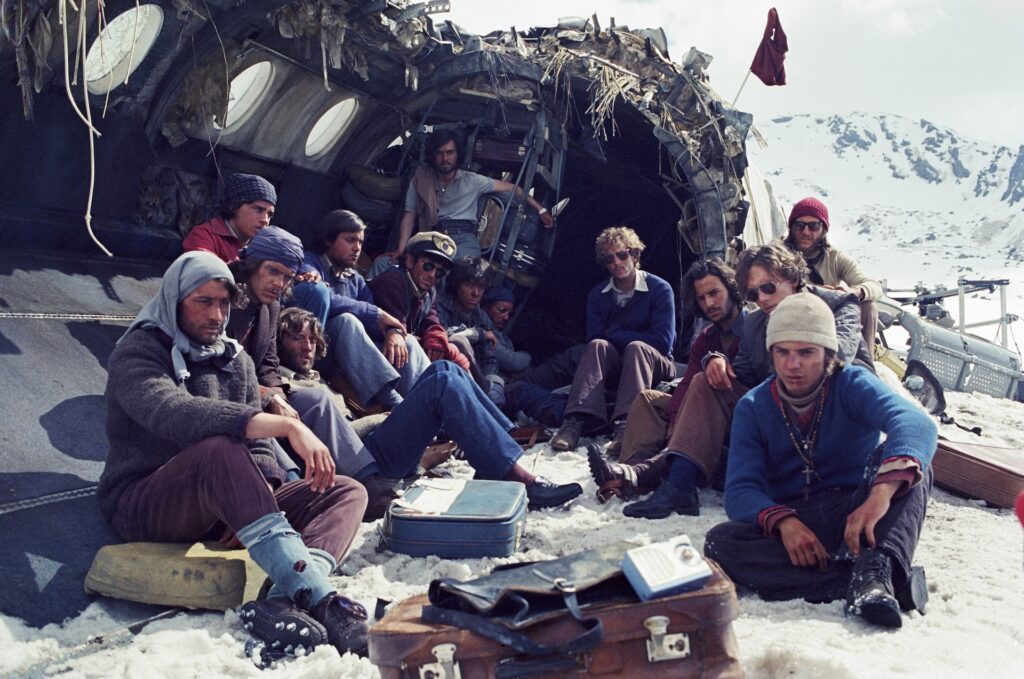
(***)
“If I die, I give you permission to feed on my body.” Sounds like the opening line of a cheesy vampire movie. Instead, it’s the turning point in a based-on-fact drama that pits men against the elements and their only weapons are ingenuity, an unflagging will to survive and courage.
In 1972, a Uruguayan rugby team of 16 players heads to an exhibition match in Chile. As they, along with friends, family and a crew, fly from Montevideo to Santiago over the Andes mountains their plane experiences turbulence. It crashes onto a mountainside, into deep snow and plunging, freezing temperatures. Forty-five people on board, only 33 survive. Over the course of 72 days more die. Hard decisions are made. Eating corpses of friends is only one of the unspeakable challenges they face.
In 1993, director Frank Marshall’s film Alive covered this tragic event. His approach seemed ghoulish, focusing more on the cannibalism than the human spirit. None of the crash’s survivors allowed their names to be associated with that film. For this production, they acquiesced. Under the tutelage of Spanish director J.A Bayona (The Orphanage), with a script he co-wrote with Bernat Vilaplana, Jaime Marques-Olearraga and Nicolás Casariego, based on the book by Pablo Vierci, those who experienced this tragedy finally have their story told cinematically, with compassion and certain artistry.
The homogenous looking cast blends together like cloned, virile young athletes. Under closer scrutiny each has his own role. Med student, pragmatist, adventurer, pessimist… All find the essence of their characters and display it with an undeniable authenticity. It’s enough to keep viewers glued to their plight. Credit: Enzo Vogrincic, Agustín Pardella, Matías Recalt, Esteban Bigliardi, Diego Vegezzi and Fernando Contigiani García.
The screenplay makes each scene purposeful, establishing the twentysomethings’ comradery, character traits, problem solving abilities, setbacks and triumphs. A hierarchy emerges, but nothing as sinister as the one in Lord of the Flies. As the players new bleak reality sets in, deep thoughts are expressed, raw emotions shown and a sense of giving up and persevering fluctuates providing a forward momentum that lasts for 2h 24m.
Editors Jaume Marti and Andrés Gil clip scenes to their core, not letting them languish. Cinematographer Pedro Luque Briozzo Scu perceptively captures the frigid wilderness, stark-white snow and intimate moments in what’s left of the fuselage. Always shooting from the perfect angle with eye-catching composition. Michael Giacchino’s musical score starts with dissonant chords and strings that whine in agony, Then it segues into more melodic sounds and finally euphoric ones. Costumes (Julio Suarez), production design (Alain Bainée), sound mixing (Jorge Adrados), and the hairdressing (Belén López-Puigcerver) are near perfect.
Bayona’s direction accentuates the personal despair, not the horror. He exposes the danger, making it look formidable, but not insurmountable. The ensemble cast shines under his guidance. Though no actor stands out, no performance seems dispensable. His thoughtful, consistent mixture of fear, anger, dread and determination is as devastating to watch and feel, as it is wondrous. If he’s made an error, it’s not ending the story succinctly.
Compare to the macabre 1993 adaptation, this version of events is more poignant, compelling and humanizing. Audiences will wish the crash never happened, feel bad for the victims and elated by their chance for survival. It’s the kind of programming that’s perfect for streaming on a Saturday night when a scary, fact-based adventure film with substance is preferred over a shallow genre movie.
The survivors and families of the deceased were right to withhold their support until a responsible director, production team and cast could tell their story with the great respect it deserves.
Perilous and horrific. Yet life-affirming and miraculous too.
Trailer: https://www.youtube.com/watch?v=pDak4qLyF4Q
Visit Film Critic Dwight Brown at DwightBrownInk.com.